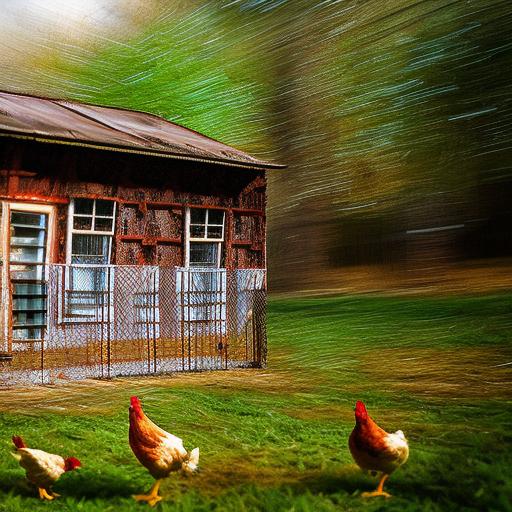Keeping chickens in a rented property is becoming increasingly popular, especially in urban areas. People are realizing the benefits of having their own fresh eggs, natural pest control, and a fun and educational hobby for the whole family. However, before embarking on this endeavor, it is important to understand the legalities of keeping chickens in a rented property, as well as how to create a safe and comfortable living space for them.
Key Takeaways
- Keeping chickens in a rented property may require legal permission from the landlord or local authorities.
- Chickens can provide fresh eggs, natural pest control, and fertilizer for a rented property.
- Consider the breed’s size, temperament, and egg-laying capabilities when choosing chickens for a rented property.
- Provide a secure coop, nesting boxes, and outdoor space for chickens to thrive in a rented property.
- Feed chickens a balanced diet, provide clean water, and monitor their health regularly in a rented property.
Understanding the Legalities of Keeping Chickens in a Rented Property
Before bringing chickens into your rented property, it is crucial to check local laws and regulations regarding chicken keeping. Different cities and municipalities have different rules and restrictions when it comes to keeping livestock, including chickens. Some areas may have specific zoning laws or restrictions on the number of chickens allowed.
To research and understand the legalities of chicken keeping in your area, start by contacting your local government or animal control office. They will be able to provide you with information on any permits or licenses required, as well as any specific regulations you need to follow. It is also a good idea to consult your lease agreement or speak with your landlord to ensure that keeping chickens is allowed.
Breaking the law when it comes to keeping chickens in a rented property can have serious consequences. You may face fines, eviction, or even legal action from your landlord or neighbors. It is important to be aware of and comply with all local laws and regulations to avoid any potential problems.
The Benefits of Keeping Chickens in a Rented Property
Keeping chickens in a rented property offers numerous benefits. One of the most obvious benefits is having access to fresh eggs. There is nothing quite like collecting eggs from your own backyard and knowing exactly where they came from. Fresh eggs are also healthier and more nutritious than store-bought eggs.
Chickens also provide natural pest control. They eat insects, slugs, and other pests that can damage your garden. By allowing your chickens to free-range in your yard, you can reduce the need for chemical pesticides and keep your garden healthy and thriving.
Keeping chickens can also be a fun and educational hobby for families. Children can learn about responsibility, animal care, and where their food comes from. It can also be a great way to spend time outdoors and connect with nature.
In addition to the benefits mentioned above, keeping chickens can also save you money. By raising your own chickens, you can significantly reduce your grocery bill by having a constant supply of fresh eggs. Chickens also produce high-quality fertilizer that can be used in your garden, eliminating the need to purchase expensive fertilizers.
Choosing the Right Breed of Chickens for a Rented Property
When choosing chickens for a rented property, it is important to consider the breed that is most suitable for your living situation. Some breeds are better suited for small spaces and urban environments, while others require more space to roam.
Bantam breeds are a popular choice for small spaces as they are smaller in size and require less space than standard-sized breeds. They are also known for being friendly and docile, making them great pets for families with children.
Another breed that is well-suited for small spaces is the Silkie. Silkies are known for their fluffy feathers and gentle temperament. They are also relatively quiet compared to other breeds, making them a good choice for urban environments.
When choosing a breed, it is important to consider factors such as egg-laying ability, temperament, and noise level. Some breeds are better egg layers than others, while some may be noisier or more aggressive. Researching different breeds and their characteristics will help you choose the right breed for your living situation.
Creating a Safe and Comfortable Living Space for Your Chickens
Creating a safe and comfortable living space for your chickens is essential to their health and well-being. A chicken coop and run should provide protection from predators, shelter from the elements, and enough space for the chickens to move around comfortably.
When designing your chicken coop, it is important to consider proper ventilation, lighting, and insulation. Good ventilation will help prevent the buildup of moisture and ammonia, which can lead to respiratory issues in chickens. Natural lighting is also important for the chickens’ well-being, so try to incorporate windows or skylights into the design. Insulation is crucial for maintaining a comfortable temperature inside the coop, especially during extreme weather conditions.
The run should be securely fenced to keep predators out and chickens in. It should also provide enough space for the chickens to move around and engage in natural behaviors such as scratching and dust bathing. Adding perches and nesting boxes will give the chickens a place to roost and lay eggs.
Feeding and Caring for Your Chickens in a Rented Property

Feeding and caring for chickens in a rented property is relatively simple. Chickens require a balanced diet that includes a combination of commercial feed, kitchen scraps, and access to fresh water.
Commercial chicken feed is formulated to provide all the necessary nutrients for healthy growth and egg production. It is important to choose a feed that is appropriate for the age and breed of your chickens. In addition to commercial feed, you can supplement their diet with kitchen scraps such as fruits, vegetables, and grains. However, it is important to avoid feeding them anything toxic or harmful, such as chocolate or onions.
Regular health checks are also important to ensure that your chickens are healthy and free from disease. This includes checking for signs of illness or injury, as well as providing vaccinations if necessary. It is also important to keep their living space clean by regularly cleaning out the coop and run and removing any waste.
Managing Noise and Odor Concerns When Keeping Chickens in a Rented Property
One common concern when keeping chickens in a rented property is noise and odor. Chickens can be noisy, especially when they are laying eggs or feeling threatened. However, there are ways to manage these concerns and minimize the impact on your neighbors.
To manage noise concerns, consider choosing quieter breeds and providing a quiet and comfortable living space for your chickens. You can also use soundproofing materials in the coop to reduce noise levels. Communicating with your neighbors about your plans to keep chickens and addressing any concerns they may have can also help alleviate noise concerns.
Odor can also be a concern when keeping chickens, especially if their living space is not properly maintained. Regularly cleaning out the coop and run, using odor-neutralizing products, and composting chicken waste can help minimize odor. It is important to be considerate of your neighbors and take steps to ensure that the odor does not become a nuisance.
Communicating with Your Landlord About Keeping Chickens in a Rented Property
Before bringing chickens into your rented property, it is important to communicate with your landlord about your plans. Some landlords may have specific rules or restrictions regarding pets or livestock, so it is important to address any concerns they may have.
Approach the conversation with your landlord in a respectful and informative manner. Provide them with information about the benefits of keeping chickens, as well as any steps you plan to take to ensure that they are properly cared for and do not cause any problems. It may also be helpful to provide references from other landlords who have allowed tenants to keep chickens.
Having a written agreement in place is also important to protect both parties. This agreement should outline the responsibilities of both the tenant and the landlord, as well as any specific rules or restrictions that need to be followed. It is important to have this agreement in writing to avoid any misunderstandings or disputes in the future.
Dealing with Potential Issues and Challenges of Keeping Chickens in a Rented Property
Keeping chickens in a rented property can come with its own set of challenges. One potential issue is the presence of predators, such as raccoons or foxes, that may be attracted to the chickens. It is important to take steps to secure the coop and run to prevent predators from gaining access. This may include reinforcing fences, installing predator-proof locks, and using deterrents such as motion-activated lights or noise devices.
Zoning laws can also be a challenge when keeping chickens in a rented property. Some areas may have specific restrictions on the number of chickens allowed or the size of the coop and run. It is important to research and understand these laws to ensure that you are in compliance.
Being prepared and proactive is key to addressing potential issues and challenges. Researching and educating yourself about chicken keeping, networking with other chicken keepers, and staying informed about local laws and regulations will help you navigate any challenges that may arise.
Finding Resources and Support for Keeping Chickens in a Rented Property
There are numerous resources and support available for those interested in keeping chickens in a rented property. Online communities, such as forums or social media groups, are a great way to connect with other chicken keepers and learn from their experiences. Local groups or organizations may also offer workshops or classes on chicken keeping.
Educational resources, such as books or websites, can provide valuable information on all aspects of chicken keeping, from choosing the right breed to building a coop. It is important to take advantage of these resources to ensure that you have the knowledge and skills necessary to care for your chickens properly.
Networking and learning from others’ experiences can be invaluable when it comes to keeping chickens in a rented property. By connecting with other chicken keepers, you can learn from their successes and challenges, as well as share your own experiences and tips.
Enjoying the Rewards of Keeping Chickens in a Rented Property
Keeping chickens in a rented property can be a rewarding and fulfilling experience. The benefits of having your own fresh eggs, natural pest control, and a fun and educational hobby are hard to beat. By doing your research, communicating with your landlord, and following all local laws and regulations, you can enjoy the rewards of keeping chickens in a rented property.
Fresh eggs from your own backyard are not only delicious but also healthier and more nutritious than store-bought eggs. Chickens also provide natural pest control, reducing the need for chemical pesticides and keeping your garden healthy. In addition, keeping chickens can be a fun and educational hobby for the whole family, teaching children about responsibility and where their food comes from.
In conclusion, keeping chickens in a rented property is a growing trend that offers numerous benefits. However, it is important to understand the legalities of chicken keeping in your area and to create a safe and comfortable living space for your chickens. By choosing the right breed, providing proper care and nutrition, managing noise and odor concerns, communicating with your landlord, and being prepared for potential issues, you can enjoy the rewards of keeping chickens in a rented property.
If you’re wondering whether you can keep chickens in a rented property, you’ll find some helpful insights in this article from Poultry Wizard. They provide valuable information on the topic, including tips on chicken coop door size and even a unique idea of using a chicken coop trampoline. To learn more about keeping chickens in a rented property, check out their website at https://poultrywizard.com.
FAQs
Can you keep chickens in a rented property?
Yes, you can keep chickens in a rented property, but you need to check with your landlord first.
Do I need permission from my landlord to keep chickens?
Yes, you need to get permission from your landlord before keeping chickens in a rented property.
What should I do if my landlord says no to keeping chickens?
If your landlord says no to keeping chickens, you should respect their decision and not keep chickens on the property.
Are there any laws or regulations I need to follow when keeping chickens in a rented property?
Yes, there are laws and regulations that you need to follow when keeping chickens in a rented property. These may include zoning laws, noise ordinances, and health and safety regulations.
How many chickens can I keep in a rented property?
The number of chickens you can keep in a rented property may vary depending on the size of the property and local regulations. It is important to check with your landlord and local authorities before keeping chickens.
What do I need to provide for my chickens?
You need to provide your chickens with a safe and secure coop, food and water, and a clean and healthy environment. You may also need to provide them with outdoor space to roam and exercise.
What are the benefits of keeping chickens in a rented property?
Keeping chickens in a rented property can provide you with fresh eggs, fertilizer for your garden, and a fun and educational hobby. It can also help reduce food waste by allowing you to compost food scraps and feed them to your chickens.
Meet Walter, the feathered-friend fanatic of Florida! Nestled in the sunshine state, Walter struts through life with his feathered companions, clucking his way to happiness. With a coop that’s fancier than a five-star hotel, he’s the Don Juan of the chicken world. When he’s not teaching his hens to do the cha-cha, you’ll find him in a heated debate with his prized rooster, Sir Clucks-a-Lot. Walter’s poultry passion is no yolk; he’s the sunny-side-up guy you never knew you needed in your flock of friends!







